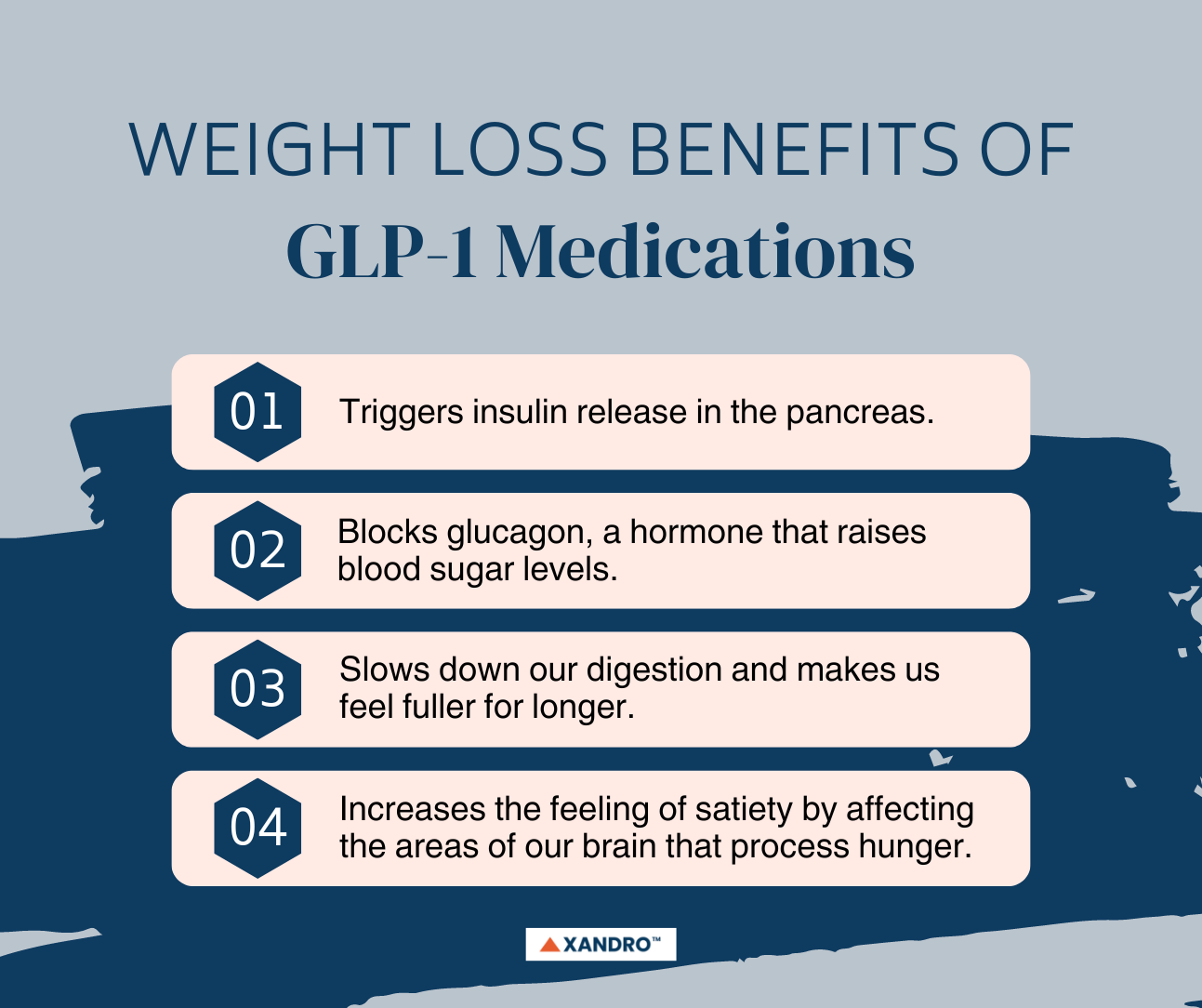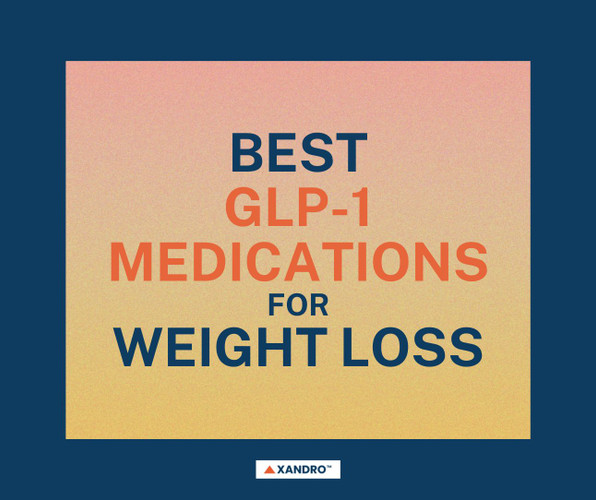Best GLP-1 Medications for Weight Loss
27th Apr 2024
How Much Weight Can You Lose On GLP-1?
GLP-1 drugs. They’re also known as glucagon-like peptide-1 agonists, GLP-1 receptor agonists, GLP-1 analogs and incretin mimetics.
But what are they and who needs them?
This article goes over what they are as well as what other lifestyle changes and supplements help with weight loss and give you energy to exercise and live a healthier lifestyle. Click below to head straight there:
- What are GLP-1 Medications?
- What GLP-1 is Best for Weight Loss?
- How Do GLP-1 Medications Work?
- How to Get GLP-1 for Weight Loss
- Benefits of Weight Loss Alternatives
- Some Alternative Weight Loss Supplements
GLP-1 agonist drugs are medications that are recommended for Type 2 diabetics or obese patients due to their ability to help lower blood sugar levels and promote weight loss.
They are usually injectable medications, with a liquid medication injected into the fatty tissue just under your skin. These areas can include your belly, the backs of your arms, your outer thighs and your upper buttocks.
Let’s keep in mind that GLP-1 agonists cannot treat your obesity or diabetes alone, this will need to be done alongside lifestyle and diet changes.
Let’s go over a list of the current GLP-1 medications currently available in the U.S.
- Dulaglutide (Trulicity®)
- Exenatide (Byette®)
- Exenatide extended-release (Bydureon®)
- Liraglutide (Victoza®) – used for obesity
- Lixisenatide (Adlyxin®)
- Semaglutide injection (Ozempic®) – used for obesity
- Semaglutide tablets (Rybelsus®) – used for obesity
- Tirzepatide (Mounjaro®) – a dual GLP-1/GIP receptor agonist
If you’re looking for how to lose weight without exercise and diet, GLP-1 agonist medications for type 2 diabetics and those with obesity might be something your doctor recommends to you.
The GLP-1 hormone is made naturally in the small intestine, triggering your pancreas to release insulin. In our bodies, insulin helps the body turn the food we eat into energy as well as lowers the amount of sugar (glucose) in the blood. When your blood sugar increases from a lack of insulin, this can lead to diabetes, with diabetics having to monitor their daily sugar intake.
Another way the GLP-1 hormone works is that is blocks glucagon (a hormone that raises your blood sugar levels when needed) release, preventing more glucose from entering the bloodstream.
In terms of weight loss, the GLP-1 hormone slows our digestion down, releasing less glucose from the food we eat into our digestion. This helps slow our stomachs from emptying, making us feel fuller for longer. It also increases our satiety, affecting areas of the brain that process hunger! The reduced food intake, appetite and hunger satiety effects of GLP-1 agonists often result in weight loss.
Studies on GLP-1 medications have found that they can all lead to weight loss (about 4.8 to 7.2kg (10.5 to 15.8 pounds) when using liraglutide and 15.3kg (33.7 pounds) when using semaglutide and making lifestyle changes. Tirzepatide has been found to have similar results.
GLP-1 medications mimic the GLP-1 hormone. They’re manufactured products that bind to our GLP receptors to trigger their roles, and the higher the dose of medication, the more extreme the effects.
Did you know? In our bodies, we have white fat and brown fat. Brown fat breaks down glucose, our blood sugar, and fat molecules to help maintain our body temperature by creating heat. Being in the cold can activate our brown fat, leading to metabolic changes in the body. The majority of our fat is white fat, though, which stores extra energy, with too much leading to obesity. We lose most of our brown fat as we grow, which is why we shiver in the cold, with lean people usually having more than overweight people.

GLP-1 medications are prescription-only medications and are only prescribed to type-2 diabetics and those with obesity. Your doctor might recommend GLP-1 medications if you’re not experiencing benefits from metformin (another type-2 diabetes medication), if you can’t take metformin, or if your blood sugar is excessively high and you don’t reach your target within three months of treatment.
What about GLP-1 weight loss for non-diabetic patients?
Some doctors may prescribe semaglutide or a high dose of liraglutide to those classified as overweight rather than obese or if they have other health conditions that are preventing them from losing weight.
Keep in mind that there are some GLP-1 side effects, the most common being nausea, vomiting, diarrhoea and loss of appetite, along with dizziness, infections, increased heart rate, headaches, indigestion and mild itchiness where you’re injected. Rare side effects include pancreatitis, acute kidney injury, worsening diabetes-related retinopathy and medullary thyroid cancer. Do not take GLP-1 agonists if you’re pregnant as they can cause developmental abnormalities in the foetus.
While there are many benefits of GLP-1, the best management of type-2 diabetes and obesity involves other alternatives too, like lifestyle and diet changes, exercise and other medications or supplements that help other health issues you might be experiencing.
Let’s keep in mind that in the semaglutide scientific study, 86.2 per cent of more than 800 participants had clinically significant weight loss. That’s a lot, but is not everyone. 13.8 per cent did not experience clinically significant weight loss.
If one GLP-1 agonist doesn’t work for you, you can try another or look at alternatives like lifestyle and supplements. If you’re not obese, overweight with other medical conditions or have type-2 diabetes, you will need to look at alternatives.
How to lose body fat is a question many of us have faced, and it’s a long journey. We need to understand how each of our bodies works and try various methods to see which fits with our lifestyle.
As mentioned, the GLP-1 drugs work best alongside lifestyle and diet changes, as well as exercise, so start there. You can even read our posts about weight loss, such as our supplements for diabetics post and our one about calcium AKG for weight management.
Further Reading: What are the best weight loss supplements?
If you’re interested in anti-aging routines, read our ones on nutrition and exercise, too!
Everyone’s body composition is different, meaning their healthy body fat percentage will also differ. For example, women between 20 and 39 should aim for about 21 to 32 per cent of body fat compared to 8 to 19 per cent for men, with this changing to 23 to 33 per cent for women and 11 to 21 per cent for men once you’re between 40 and 59 years of age. This just goes to show that the best diet and exercise routine differs between people, as what constitutes as healthy for each of us is different — no comparisons here, thanks!
If you’re looking for alternative weight loss pills for diabetes Type 2, you might want to look into these:
- Spermidine: Mimics the lifestyle and diet control method of intermittent fasting and may give you energy and help your metabolism. It’s also been found to improve our gut microbiome and lower our body mass index. Grab your bottle of Spermidine here!
Further Reading: Spermidine for Weight Loss
- Resveratrol: Does resveratrol help with weight loss? Yes, it’s been found to lower body mass in those with obesity, along with lowering weight, BMI, fat mass and weight circumference. Grab yours today!
- Whey Protein: Whey protein, like Lean XP, helps increase your protein intake, reduce hunger by making you feel fuller and boost your metabolism.
- Ashwagandha: May increase leptin, the appetite suppression hormone so you feel full from less food. Also helps with sleep. Learn more about the benefits of Shoden® Ashwagandha.
- L-carnitine: L-carnitine weight loss benefits come from the fact it can move fatty acids into your cells to be burned for energy. This amino acid may reduce body fat, BMI and fat mass.
- Antioxidants: These can reduce oxidative stress, improve immune function and reduce inflammation, helping with weight management. The antioxidant fucoxanthin is found in brown seaweed and may have antiobesity, antioxidant and anti-inflammatory properties, while pomegranate and curcumin supplements may help with weight loss as they’re high in antioxidants.
- Multivitamins: Helps give your body the important vitamins and minerals you might not be getting throughout the day.
- Caffeine: A stimulant that may reduce weight, body fat and body mass index. Green tea can also help suppress your appetite and boost fat metabolism.
Read more here: Supplements for Weight Loss
Looking for how to increase metabolic rate? Read our post on Zone 2 training!

End Note
There are so many different weight loss drugs, supplements, diets and lifestyle regimes out there that it can quickly become overwhelming. Before taking any new medications or supplements, speak with your medical professional to make sure what you’re taking aligns with your medical background.
Make sure to combine any supplements and drugs with healthy lifestyle changes, such as eating a diet with a wide range of vitamins and minerals, regularly exercising, getting enough sleep and managing your stress.
It’s a slow and steady process, but it’s worth it to become a healthier you.
